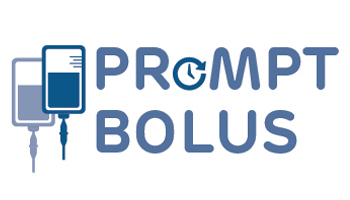HOW CAN WE HELP YOU? Call 1-800-TRY-CHOP
In This Section
Small Change May Optimize Rescue From Systemic Failure

In the Pragmatic Pediatric Trial of Balanced Versus Normal Saline Fluid in Sepsis (PRoMPT BOLUS), co-principal investigators Fran Balamuth, MD, PhD, and Scott Weiss, MD, MSCE, aim to build an evidence base for the most effective crystalloid fluid.
droseyb [at] email.chop.edu (By Barb Drosey)
What’s fast-moving, all-encompassing, and plays no favorites? Sepsis, an indiscriminate systemic condition that escalates so rapidly, national guidelines recommend treatment begin within 20 minutes of arrival to the emergency department. What’s more alarming is that anyone can get sepsis – a healthy child or one who has underlying medical problems.
“Certainly, kids are at higher risk for sepsis if they have an underlying immune system problem, cancer, or a central line, but sepsis could affect any child,” said Fran Balamuth, MD, PhD, associate director of research in the Division of Emergency Medicine at Children’s Hospital of Philadelphia, and an assistant professor of Pediatrics at the Perelman School of Medicine at the University of Pennsylvania.
Embedded tools within CHOP’s electronic health record help clinicians recognize sepsis more quickly, which can be tricky to detect, and sets the sepsis protocol of rapid antibiotics, rapid fluids, and screening for organ dysfunction in motion. The cornerstones of sepsis treatment are antibiotics and intravenous fluids, and having this order set in the EPIC software system as well as a stocked sepsis cart at the ready helps expedite care, including the administration of fluids within that critical 20-minute window. Crystalloid resuscitation with normal saline or lactated Ringer’s is the current standard of care, but which is optimal is unknown. In the Pragmatic Pediatric Trial of Balanced Versus Normal Saline Fluid in Sepsis (PRoMPT BOLUS), principal investigator Dr. Balamuth and her team aim to build an evidence base for the most effective crystalloid fluid.
Dr. Balamuth, co-director of CHOP’s pediatric sepsis program, is enthusiastic about this collaborative effort between the emergency department and the pediatric intensive care unit (PICU). While most patients will be enrolled in the study in the ED, about half will receive treatment in the PICU, which is the clinical realm of co-PI Scott Weiss, MD, MSCE, attending physician at CHOP and assistant professor of Anesthesiology, Critical Care, and Pediatrics at Penn.
Considered a vanguard study, PRoMPT BOLUS is a follow-up to the randomized controlled pilot feasibility study led by Dr. Balamuth and published in Academic Emergency Medicine.
Advancing Sepsis Treatment
For a child with sepsis, survival depends upon aggressive therapy delivered quickly, leaving little time for a thorough informed consent discussion. In such cases, the U.S. Food and Drug Administration allows for an exception from informed consent so that patients may be randomized into trial within the critical timeframe necessary to evaluate the treatment. It’s important to note that both fluids are considered “standard of care” for sepsis, and so all children in this trial will receive one of two appropriate treatment options.
“There are certain emergent conditions that, if we’re going to learn how to treat them better, must have a mechanism to study them when we have to treat before there is time to get consent,” Dr. Balamuth said. “It’s largely impossible to study the emergent resuscitation of sepsis without an exception, and this was approved by both the CHOP Institutional Review Board and the FDA.”
As a requirement of the trial’s exception from informed consent status, investigators must educate potential participants about the study, its implications, and how they may opt out. Prior to the pilot study, the researchers held focus groups and conducted surveys of more than 200 families in the ED and the PICU, as well as a focus group with adolescent patients. In addition to sharing what PRoMPT BOLUS is all about with the surrounding community, Dr. Balamuth said the team is also ensuring children with underlying medical conditions who are at higher risk for sepsis and their families are well informed about the current trial.
“We are doing particular outreach in the oncology clinic and the PICU where some of the children with complicated medical conditions have repeat visits to the ICUs,” Dr. Balamuth said, adding that the majority response to the trial has been positive. “I think people know that sepsis is a scary condition, and that there is no one treatment or medication that works. PRoMPT BOLUS is investigating which of two currently available standards of care for fluid resuscitation is most effective. If one of them turns out to be better than the other, and we can save children’s lives from a potentially deadly condition, that’s our main goal, and I think families are excited about that.”
How Exception From Informed Consent Works
Patients for whom the ED doctor suspects septic shock will be enrolled and treated with one of two commonly used fluids. The study team will try to ask permission before a patient is enrolled into PRoMPT BOLUS. However, because patients with sepsis must be treated quickly, there may not be enough time to locate and talk to the patient’s parent or guardian about the study. In this case, patients may be enrolled in the study through the exception from informed consent process. Then, the study team will inform the parent/guardian as soon as they can about the study and seek permission to continue in the study and to use their child’s data. The ultimate choice to remain in the study will always be with the parent/guardian.

The study team is not aware of any reason, at this time, why anyone with sepsis would not choose to participate if awake and able to take part in decisions about their care; however, families may choose to opt out of participation by visiting the BOLUS website. They will then receive a bracelet in the mail that their child may wear or that the parent or caregiver may hold for them. The child’s name will also appear on an opt-out list that clinicians consult prior to enrolling any child in the clinical trial. Also important to note is that if a child is enrolled, parents and/or guardians may withdraw them from the study at any time.
Interstate to International
Partnering with CHOP for PRoMPT BOLUS is the University of Pittsburgh Medical Center Children’s Hospital of Pittsburgh, in collaboration with Robert Hickey, MD, director of clinical research, Division of Pediatric Emergency Medicine. The goal is to enroll 650 patients across both sites by 2023, with CHOP beginning enrollment soon.
“Based on the number of patients we enrolled during the pilot, we think 650 participants for the vanguard study is feasible between CHOP and Pittsburgh,” Dr. Balamuth said. “We are looking for a difference in kidney injury and the duration of hospitalization for children when they receive one fluid or the other.”
This trial will ultimately lead to a larger study that will enroll more than 8,000 children with sepsis across the United States, Canada, Australia, and New Zealand. The large sample size of the future study will aid researchers in further assessing what they expect to be a relatively narrow difference in effect between the two groups.
“Probably every kid in America gets a fever at least once a year. The vast majority of those kids will never get sepsis,” Dr. Balamuth said.
PRoMPT BOLUS is for the ones whose condition takes a potentially life-threatening turn.